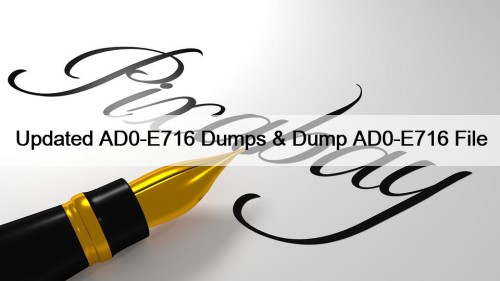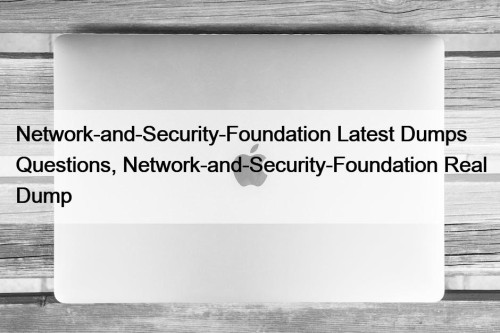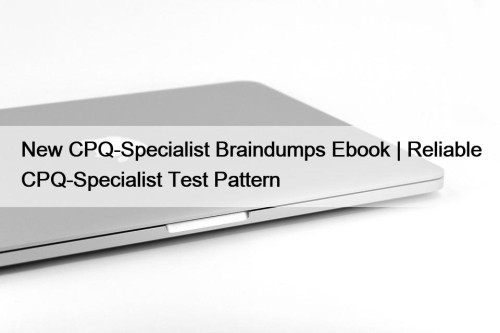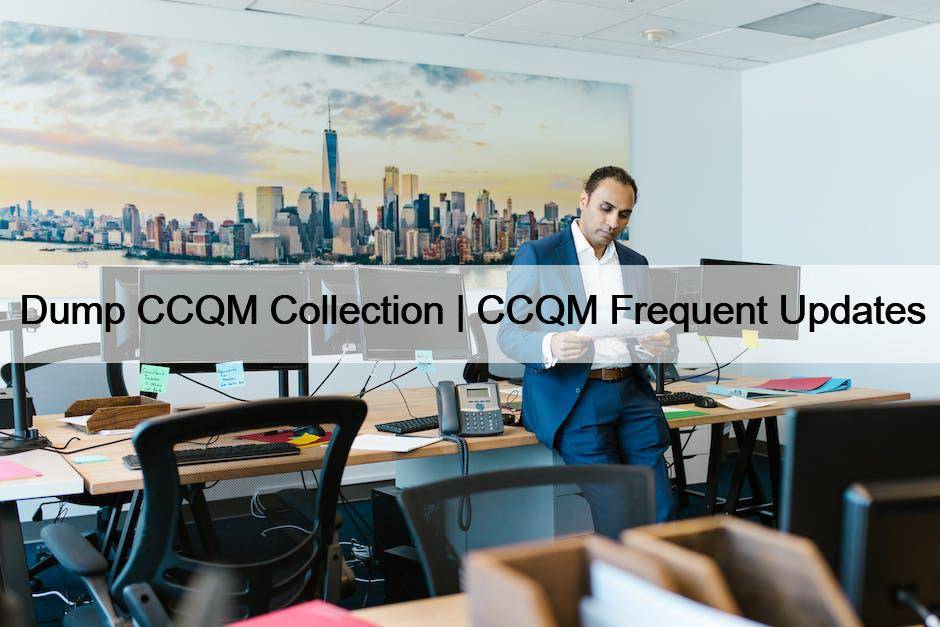Most Popular
 Updated AD0-E716 Dumps & Dump AD0-E716 File
Updated AD0-E716 Dumps & Dump AD0-E716 File
BONUS!!! Download part of PracticeTorrent AD0-E716 dumps for free: https://drive.google.com/open?id=1vt5KtVwBSK_Jz-M5a0tojqjicUiJVg9qFor ...
 Network-and-Security-Foundation Latest Dumps Questions, Network-and-Security-Foundation Real Dump
Network-and-Security-Foundation Latest Dumps Questions, Network-and-Security-Foundation Real Dump
The study material is made by professionals while thinking about ...
 New CPQ-Specialist Braindumps Ebook | Reliable CPQ-Specialist Test Pattern
New CPQ-Specialist Braindumps Ebook | Reliable CPQ-Specialist Test Pattern
Among all substantial practice materials with similar themes, our CPQ-Specialist ...



Dump CCQM Collection | CCQM Frequent Updates

People always feel fear of the unknown thing and cannot handle themselves with a sudden change. However, our CCQM exam questions can stand by your side. And we are determined to devote ourselves to serving you with the superior CCQM Study Materials in this career. Here are some features of our CCQM learning guide in our free demos which you can free download, you can understand in detail and make a choice.
ASQ CCQM Exam Syllabus Topics:
| Topic | Details |
|---|---|
| Topic 1 |
|
| Topic 2 |
|
| Topic 3 |
|
| Topic 4 |
|
Accurate Dump CCQM Collection | Easy To Study and Pass Exam at first attempt & Authoritative CCQM: Certified Construction Quality Manager
As is known to us, getting the newest information is very important for all people to pass the exam and get the certification in the shortest time. In order to help all customers gain the newest information about the CCQM exam, the experts and professors from our company designed the best CCQM test guide. The experts will update the system every day. If there is new information about the exam, you will receive an email about the newest information about the CCQM Learning Materials. We can promise that you will never miss the important information about the CCQM exam.
ASQ Certified Construction Quality Manager Sample Questions (Q48-Q53):
NEW QUESTION # 48
The effectiveness of steps taken to achieve organizational goals based on implemented CoQ improvements should be evaluated by
- A. analyzing both short-term results and long-term trends in quality and financial performance
- B. focusing exclusively on short-term improvements to judge effectiveness
- C. evaluating how many CoQ improvement projects are initiated
- D. considering the initial cost reductions that are achieved
Answer: A
Explanation:
The effectiveness of steps taken to achieve organizational goals based on implemented Cost of Quality (CoQ) improvements should be evaluated by considering both short-term results and long-term trends. A comprehensive assessment provides a clearer picture of how quality initiatives impact financial performance and overall project success.
* Short-Term Results: These include immediate cost savings from reduced defects, rework, and material waste. Measuring these quick improvements helps justify initial investments in quality management.
* Long-Term Trends: Over time, sustained CoQ improvements lead to reduced failure costs, enhanced reputation, improved client satisfaction, and increased operational efficiency. Tracking long-term trends ensures that CoQ efforts remain effective and contribute to continuous improvement.
Organizations that focus solely on short-term improvements (Option A) may miss hidden costs and inefficiencies that only emerge over time. Initial cost reductions (Option B) may not reflect overall effectiveness if quality deteriorates later. The number of CoQ projects initiated (Option D) does not necessarily correlate with successful outcomes; effectiveness is better measured by performance data and financial impact.
* Quality Management in Construction Projects emphasizes that quality performance should be monitored through both short-term and long-term evaluations to ensure sustained cost benefits.
* QA Library discusses how failure costs (internal/external) and appraisal costs should be continuously analyzed to optimize quality investments.
* Cost of Quality (CoQ) principles suggest that measuring quality effectiveness requires tracking cost reductions, process efficiency, and defect rates over time.
ASQ Construction Quality Management (CQM) References:Would you like additional insights on quality cost tracking methods or benchmarking strategies?
NEW QUESTION # 49
When a project faces significant scope changes, including the addition of new features halfway through, how should a Construction Quality Manager evaluate and prioritize inspections?
- A. Reassess and prioritize inspections based on the new elements' criticality and their potential impact on project integrity.
- B. Prioritize inspections based on the original project plan and impact on schedule.
- C. Focus inspections and testing on new project elements, instead of on established parts of the construction.
- D. Concentrate inspections primarily on areas where the most resources have been allocated.
Answer: A
Explanation:
When a project undergoes significant scope changes, including the addition of new features midway through construction, it is crucial to reassess and prioritize inspections to ensure structural integrity, compliance, and overall quality.
* Assessing the Impact of New Elements
* New project elements may introduce additional risks, require different materials, or alter the structural load distribution. Inspections should be reprioritized to focus on these new elements' impact on the entire project.
* Three-Phase Control System in Construction
* The Three-Phase Control System (Preparatory, Initial, and Follow-up phases) ensures quality compliance. When scope changes occur, each phase should be revisited to account for modifications.
* The preparatory phase should be updated to redefine quality expectations, the initial phase should establish specific testing protocols for new elements, and the follow-up phase should monitor adherence to revised standards.
* Mitigating Risk and Ensuring Compliance
* A significant scope change affects the project's safety, compliance, and quality. Prioritizing inspections based on the criticality of the new elements ensures that no structural weaknesses or compliance issues arise.
* Project Integrity and Long-Term Performance
* ASQ and DOE quality management principles highlight that project changes should be integrated into the existing quality management system without compromising the integrity of the overall structure.
* Delayed or improperly planned inspections can lead to undetected defects, requiring costly corrections later.
Detailed JustificationThus, reassessing and reprioritizing inspections based on new elements' criticality ensures project integrity, compliance, and overall construction quality.
NEW QUESTION # 50
The effectiveness of steps taken to achieve organizational goals based on implemented CoQ improvements should be evaluated by
- A. analyzing both short-term results and long-term trends in quality and financial performance
- B. focusing exclusively on short-term improvements to judge effectiveness
- C. evaluating how many CoQ improvement projects are initiated
- D. considering the initial cost reductions that are achieved
Answer: A
Explanation:
The effectiveness of steps taken to achieve organizational goals based on implemented Cost of Quality (CoQ) improvements should be evaluated by considering both short-term results and long-term trends. A comprehensive assessment provides a clearer picture of how quality initiatives impact financial performance and overall project success.
* Short-Term Results: These include immediate cost savings from reduced defects, rework, and material waste. Measuring these quick improvements helps justify initial investments in quality management.
* Long-Term Trends: Over time, sustained CoQ improvements lead to reduced failure costs, enhanced reputation, improved client satisfaction, and increased operational efficiency. Tracking long-term trends ensures that CoQ efforts remain effective and contribute to continuous improvement.
Organizations that focus solely on short-term improvements (Option A) may miss hidden costs and inefficiencies that only emerge over time. Initial cost reductions (Option B) may not reflect overall effectiveness if quality deteriorates later. The number of CoQ projects initiated (Option D) does not necessarily correlate with successful outcomes; effectiveness is better measured by performance data and financial impact.
* Quality Management in Construction Projects emphasizes that quality performance should be monitored through both short-term and long-term evaluations to ensure sustained cost benefits.
* QA Library discusses how failure costs (internal/external) and appraisal costs should be continuously analyzed to optimize quality investments.
* Cost of Quality (CoQ) principles suggest that measuring quality effectiveness requires tracking cost reductions, process efficiency, and defect rates over time.
ASQ Construction Quality Management (CQM) References:Would you like additional insights on quality cost tracking methods or benchmarking strategies?
NEW QUESTION # 51
What is the most important factor to consider when establishing criteria for final inspection, testing, and commissioning in a construction project?
- A. Ensuring the presence of all project stakeholders during the final inspection
- B. Determining the total number of personnel required to conduct the final inspections
- C. Scheduling the final inspection at the earliest convenience
- D. Confirming that all systems operate according to design specifications
Answer: D
Explanation:
Final inspection, testing, and commissioning are critical phases in a construction project, ensuring that all systems function as intended before handover. The most important factor in establishing criteria for these processes is verifying that all systems operate according to design specifications.
* Compliance with Design & Regulatory Standards: The inspection process should confirm that construction outputs meet contract specifications, building codes, and safety regulations.
* System Functionality: Testing should validate that mechanical, electrical, plumbing, and safety systems perform as required under real-world conditions.
* Avoiding Future Operational Issues: Ensuring that systems work as designed minimizes defects, warranty claims, and costly post-handover corrections.
Other options are insufficient because:
* Option A (Scheduling at earliest convenience) could result in inadequate verification.
* Option B (Ensuring all stakeholders are present) is useful but does not determine system functionality.
* Option C (Focusing on personnel count) does not ensure compliance with project specifications.
* Quality Management in Construction Projects emphasizes that final testing must be performance-based rather than just procedural.
* QA Library outlines best practices for ensuring compliance through systematic inspections and commissioning.
* Three-Phase Control System requires verification at every stage to ensure compliance before final approval.
ASQ Construction Quality Management (CQM) References:Would you like further details on creating a standardized final inspection checklist?
NEW QUESTION # 52
What strategy should be used to ensure that interpretations of CoQ data accurately reflect the quality costs' impact on the organization?
- A. Use qualitative feedback from team members as the basis for interpretation
- B. Compare CoQ data with internal success metrics to assess impact on operational efficiency
- C. Base interpretations on cost data from the most recent project
- D. Compare all CoQ data against industry standards regardless of context to assess impact on operational efficiency
Answer: B
Explanation:
To ensure that interpretations of Cost of Quality (CoQ) data accurately reflect its impact on the organization, it is essential to compare CoQ data with internal success metrics. This approach allows organizations to:
* Assess Operational Efficiency: CoQ metrics should be analyzed alongside internal performance indicators such as defect rates, rework costs, and overall process efficiency.
* Identify Trends and Root Causes: Comparing CoQ data with internal metrics helps distinguish between short-term fluctuations and systemic quality issues.
* Optimize Cost Allocation: Organizations can determine whether investments in quality improvement initiatives are leading to measurable efficiency gains.
Other options are less effective because:
* Option B (Comparing all CoQ data to industry standards) does not account for the specific operational context.
* Option C (Using only the most recent project's data) ignores long-term performance trends.
* Option D (Relying on qualitative feedback) lacks quantitative validation for decision-making.
* QA Library highlights best practices for tracking CoQ metrics in relation to internal performance indicators.
* Quality Management in Construction Projects details how CoQ analysis should integrate with financial and operational benchmarks.
* DCS QA Manual provides guidelines on evaluating CoQ trends for continuous improvement.
ASQ Construction Quality Management (CQM) References:Would you like insights on specific CoQ tracking software or automation tools?
NEW QUESTION # 53
......
Now is not the time to be afraid to take any more difficult certification exams. Our CCQM learning quiz can relieve you of the issue within limited time. Our website provides excellent CCQM learning guidance, practical questions and answers, and questions for your choice which are your real strength. You can take the CCQM Training Materials and pass it without any difficulty. As long as you can practice CCQM study guide regularly and persistently your goals of making progress and getting certificates smoothly will be realized just like a piece of cake.
CCQM Frequent Updates: https://www.testpdf.com/CCQM-exam-braindumps.html
- CCQM New Dumps Pdf 🙋 CCQM Valid Exam Labs 🚈 CCQM Real Braindumps 🔧 Copy URL ▶ www.dumps4pdf.com ◀ open and search for ( CCQM ) to download for free 🕟CCQM New Exam Materials
- Latest CCQM Braindumps Files 🆑 Latest CCQM Braindumps Files 🧹 Reliable CCQM Test Online 🧸 Easily obtain ▛ CCQM ▟ for free download through { www.pdfvce.com } 👾Useful CCQM Dumps
- Test CCQM Study Guide ❗ Latest Braindumps CCQM Ebook 👦 CCQM Test Dumps Demo 🛫 Search on ➥ www.pass4test.com 🡄 for ⇛ CCQM ⇚ to obtain exam materials for free download 🪑CCQM Test Dumps Demo
- Reliable CCQM Dumps Book 🍻 Exam CCQM Sample 🐝 Useful CCQM Dumps 🦺 Search for ▷ CCQM ◁ and download it for free immediately on ▷ www.pdfvce.com ◁ 😽CCQM Valid Practice Materials
- ASQ CCQM PDF Questions - Accessible On Any Device ❤️ Go to website ▛ www.torrentvalid.com ▟ open and search for 《 CCQM 》 to download for free 💠CCQM New Exam Materials
- Marvelous Dump CCQM Collection - Guaranteed ASQ CCQM Exam Success with High Pass-Rate CCQM Frequent Updates 🕊 The page for free download of ➡ CCQM ️⬅️ on ⮆ www.pdfvce.com ⮄ will open immediately 📻CCQM Valid Exam Labs
- Reliable CCQM Exam Simulations 🛰 Latest CCQM Braindumps Files 🌑 CCQM New Exam Materials 👜 Immediately open ▷ www.pdfdumps.com ◁ and search for ▷ CCQM ◁ to obtain a free download 👮CCQM Test Dumps Demo
- Free PDF 2025 ASQ Reliable Dump CCQM Collection 🈵 Download ▛ CCQM ▟ for free by simply entering ➤ www.pdfvce.com ⮘ website 🛹Exam CCQM Sample
- 2025 Dump CCQM Collection - Trustable ASQ CCQM Frequent Updates: Certified Construction Quality Manager 💷 Download ☀ CCQM ️☀️ for free by simply searching on ➥ www.examdiscuss.com 🡄 🔄Reliable CCQM Exam Simulations
- 2025 Efficient ASQ Dump CCQM Collection 👫 Search for 【 CCQM 】 and easily obtain a free download on ⇛ www.pdfvce.com ⇚ 🛰Latest Braindumps CCQM Ebook
- CCQM study materials - ASQ CCQM dumps VCE 🔧 Search on 「 www.examsreviews.com 」 for ▷ CCQM ◁ to obtain exam materials for free download ⌛CCQM Passing Score Feedback
- CCQM Exam Questions
- kurslms.com course6.skill-forward.de www.dmb-pla.com impexacademy.net skill.astralorbitals.com zoereed804.blogrelation.com lms.myskillworld.in smartkidscampus.com course.tissletti.com wzsj.lwtcc.cn
Tags: Dump CCQM Collection, CCQM Frequent Updates, CCQM Exam Lab Questions, Trustworthy CCQM Exam Content, CCQM Latest Exam Practice